小学英语基础知识及重点句型
- 格式:doc
- 大小:40.00 KB
- 文档页数:8

四年级上册一至三单元英语单词及句型四年级上册一至三单元英语单词及句型四年级是小学阶段的重要学习阶段,英语学科也同样是小学课程中的重点之一。
本文将介绍四年级上册一至三单元英语单词及句型,在学习英语时,这些单词和句型都是必不可少的。
一、Unit 11. apple2. banana3. pear4. orange5. What’s this? It’s an apple.6. What’s that? It’s a banana.7. Is this a pear? Yes, it is. / No, it isn't.以上是Unit 1中出现的单词和句型。
其中apple, banana, pear和orange 都是水果的名称,对于初学者来说是必备的基础单词。
二、Unit 21. cat2. dog3. rabbit4. fish5. I have a cat.6. Do you have a dog? Yes, I do. / No, I don’t.7. What do you have? I have a rabbit and a fish.Unit 2中出现的单词和句型主要涉及到宠物和问询,对于学生来说是一些生活常识和实用表达。
三、Unit 31. book2. pen3. ruler4. eraser5. Let’s read a book.6. Can I borrow your pen? Sure, here you are.7. This is my ruler. That is your ruler.Unit 3中的单词集中在文具类别,在学习英语中,文具单词是基本中的基本,这也是为日后英语写作和阅读做铺垫。
以上是四年级上册一至三单元英语单词及句型的介绍。
这些单词和句型都是学生们初步学习英语时必须掌握的基础知识。
学生们在学习英语过程中,应该充分利用课余时间,多加练习,争取在不久的将来能自如地运用这些单词和句型,为日后的英语学习打下良好的基础。
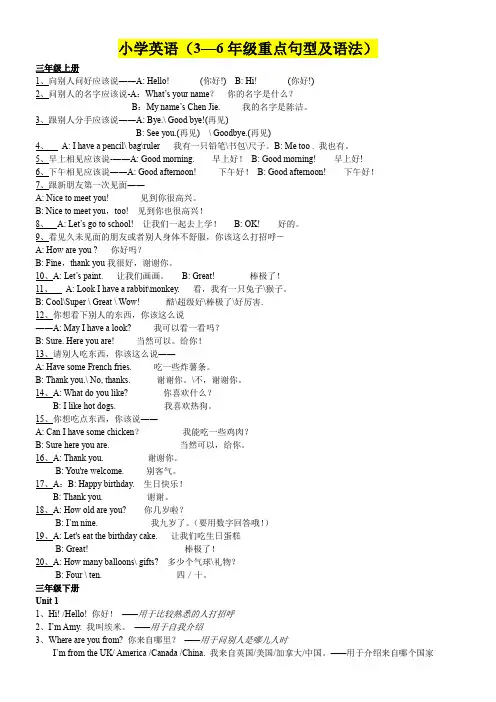
小学英语(3—6年级重点句型及语法)三年级上册1、向别人问好应该说――A: Hello! (你好!) B: Hi! (你好!)2、问别人的名字应该说-A:What’s your name?你的名字是什么?B:My name’s Chen Jie. 我的名字是陈洁。
3、跟别人分手应该说――A: Bye.\ Good bye!(再见)B: See you.(再见) \ Goodbye.(再见)4、A: I have a pencil\ bag\ruler 我有一只铅笔\书包\尺子。
B: Me too . 我也有。
5、早上相见应该说-――A: Good morning. 早上好!B: Good morning! 早上好!6、下午相见应该说――A: Good afternoon! 下午好!B: Good afternoon! 下午好!7、跟新朋友第一次见面――A: Nice to meet you! 见到你很高兴。
B: Nice to meet you,too! 见到你也很高兴!8、A: Let’s go to school! 让我们一起去上学!B: OK! 好的。
9、看见久未见面的朋友或者别人身体不舒服,你该这么打招呼-A: How are you ? 你好吗?B: Fine,thank you我很好,谢谢你。
10、A: Let’s paint. 让我们画画。
B: Great! 棒极了!11、A: Look I have a rabbit\monkey. 看,我有一只兔子\猴子。
B: Cool\Super \ Great \ Wow! 酷\超级好\棒极了\好厉害.12、你想看下别人的东西,你该这么说――A: May I have a look? 我可以看一看吗?B: Sure. Here you are! 当然可以。
给你!13、请别人吃东西,你该这么说――A: Have some French fries. 吃一些炸薯条。
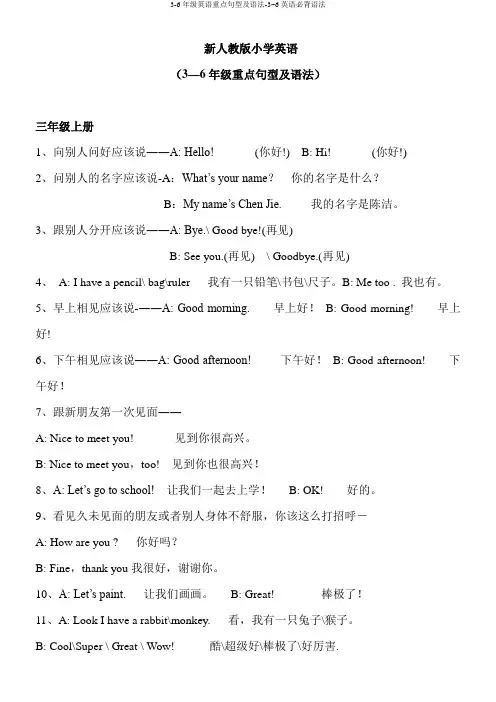
新人教版小学英语(3—6年级重点句型及语法)三年级上册1、向别人问好应该说――A: Hello! (你好!) B: Hi! (你好!)2、问别人的名字应该说-A:What’s your name?你的名字是什么?B:My name’s Chen Jie. 我的名字是陈洁。
3、跟别人分开应该说――A: Bye.\ Good bye!(再见)B: See you.(再见) \ Goodbye.(再见)4、A: I have a pencil\ bag\ruler 我有一只铅笔\书包\尺子。
B: Me too . 我也有。
5、早上相见应该说-――A: Good morning. 早上好!B: Good morning! 早上好!6、下午相见应该说――A: Good afternoon! 下午好!B: Good afternoon! 下午好!7、跟新朋友第一次见面――A: Nice to meet you! 见到你很高兴。
B: Nice to meet you,too! 见到你也很高兴!8、A: Let’s go to school! 让我们一起去上学!B: OK! 好的。
9、看见久未见面的朋友或者别人身体不舒服,你该这么打招呼-A: How are you ? 你好吗?B: Fine,thank you我很好,谢谢你。
10、A: Let’s paint. 让我们画画。
B: Great! 棒极了!11、A: Look I have a rabbit\monkey. 看,我有一只兔子\猴子。
B: Cool\Super \ Great \ Wow! 酷\超级好\棒极了\好厉害.12、你想看下别人的东西,你该这么说――A: May I have a look? 我可以看一看吗?B: Sure. Here you are! 当然可以。
给你!13、请别人吃东西,你该这么说――A: Have some French fries. 吃一些炸薯条。
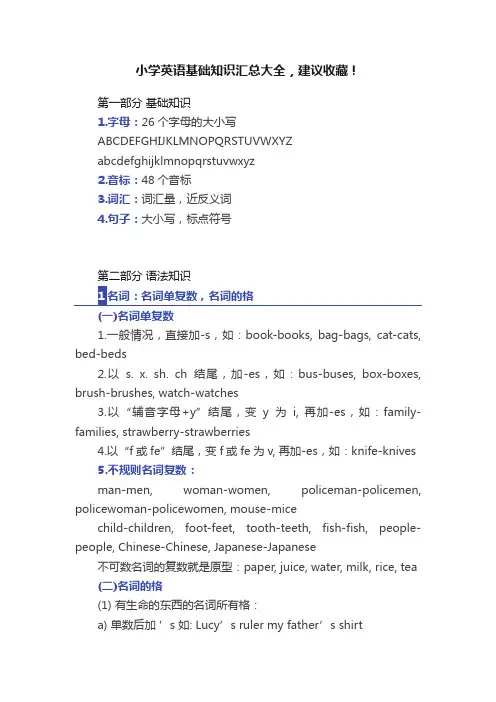
小学英语基础知识汇总大全,建议收藏!第一部分基础知识1.字母:26个字母的大小写ABCDEFGHIJKLMNOPQRSTUVWXYZabcdefghijklmnopqrstuvwxyz2.音标:48个音标3.词汇:词汇量,近反义词4.句子:大小写,标点符号第二部分语法知识1名词:名词单复数,名词的格(一)名词单复数1.一般情况,直接加-s,如:book-books, bag-bags, cat-cats, bed-beds2.以s. x. sh. ch结尾,加-es,如:bus-buses, box-boxes, brush-brushes, watch-watches3.以“辅音字母+y”结尾,变y为i, 再加-es,如:family-families, strawberry-strawberries4.以“f或fe”结尾,变f或fe为v, 再加-es,如:knife-knives5.不规则名词复数:man-men, woman-women, policeman-policemen, policewoman-policewomen, mouse-micechild-children, foot-feet, tooth-teeth, fish-fish, people-people, Chinese-Chinese, Japanese-Japanese不可数名词的复数就是原型:paper, juice, water, milk, rice, tea(二)名词的格(1) 有生命的东西的名词所有格:a) 单数后加’s 如: Lucy’s ruler my father’s shirtb) 以s 结尾的复数名词后加’如: his friends’ bagsc) 不以s 结尾的复数后加’s children’s shoes并列名词中,如果把’s加在最后一个名词后,表示共有, 如:Tom and Mike’s car 汤姆和迈克共有的小汽车要表示所有物不是共有的,应分别在并列名词后加’sTom’s and Mike’s cars 汤姆和麦克各自的小汽车(2)表示无生命东西的名词通常用“ o f +名词”来表示所有关系:如:a picture of the classroom a map of China2冠词:不定冠词,定冠词种类(1)不定冠词:a / an元音开头的可数名词前用an :an egg / an apple / an orange / an eraser / an answer / an ID card / an alarm clock / an actor / an actress / an e-mail / an address / an event / an example / an opera / an houran old man / an interesting book / an exciting sport / an action movie / an art lesson /(2)定冠词:the定冠词的用法:(1)特指某(些)人或某(些)物:The ruler is on the desk.(2)复述上文提到的人或物:He has a sweater. The sweater is new.(3)谈话双方都知道的人或物:The boys a ren’t at school.(4)在序数词前:John’s birthday is February the second.(5)用于固定词组中:in the morning / afternoon / evening不用冠词的情况:(1)专有名词前:China is a big country.(2)名词前有定语:this , that , my , your , some, any , no 等:This is my baseball.(3)复数名词表示一类人和事:Monkeys ca n’t swim. They areteachers.(4)在节日,日期,月份,季节前:T oday is Christmas Day. It’s Sunday.(5)一日三餐前:We have breakfast at 6:30.(6)球类棋类运动前:They often play football after class. He plays chess at home.* 但乐器前要用定冠词:I play the guitar very well.(7)学科名称前:My favorite subject is music.(8)在称呼或头衔的名词前:This is Mr Li.(9)固定词组中:at noon at night by bus3代词、形容词、副词代词:人称代词,物主代词人称代词物主代词主格宾格第一人称单数I(我)me my(我的)复数we(我们)us our(我们的)第二人称单数you(你) you your(你的)复数you(你们)you your(你们的)第三人称单数he(他)him his(他的)she(她)her her(她的)it(它)it its(它的)复数they(他们/她们/它们)them their(他们的/她们的/它们的)形容词,副词:比较级,最高级(一)、形容词的比较级1、形容词比较级在句子中的运用:两个事物或人的比较用比较级,比较级后面一般带有单词than。
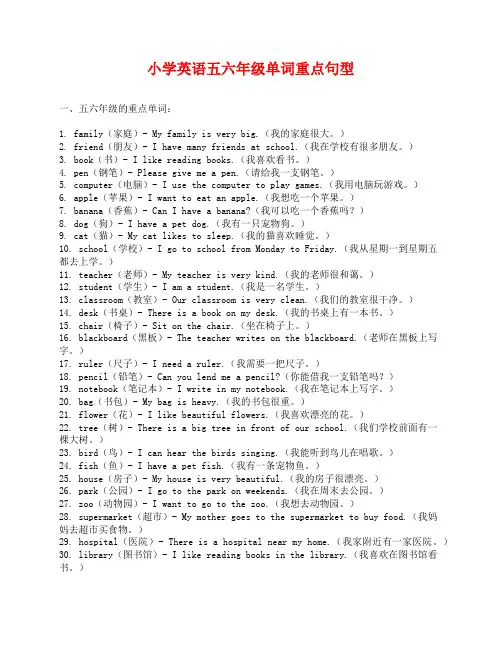
小学英语五六年级单词重点句型一、五六年级的重点单词:1. family(家庭)- My family is very big.(我的家庭很大。
)2. friend(朋友)- I have many friends at school.(我在学校有很多朋友。
)3. book(书)- I like reading books.(我喜欢看书。
)4. pen(钢笔)- Please give me a pen.(请给我一支钢笔。
)5. computer(电脑)- I use the computer to play games.(我用电脑玩游戏。
)6. apple(苹果)- I want to eat an apple.(我想吃一个苹果。
)7. banana(香蕉)- Can I have a banana?(我可以吃一个香蕉吗?)8. dog(狗)- I have a pet dog.(我有一只宠物狗。
)9. cat(猫)- My cat likes to sleep.(我的猫喜欢睡觉。
)10. school(学校)- I go to school from Monday to Friday.(我从星期一到星期五都去上学。
)11. teacher(老师)- My teacher is very kind.(我的老师很和蔼。
)12. student(学生)- I am a student.(我是一名学生。
)13. classroom(教室)- Our classroom is very clean.(我们的教室很干净。
)14. desk(书桌)- There is a book on my desk.(我的书桌上有一本书。
)15. chair(椅子)- Sit on the chair.(坐在椅子上。
)16. blackboard(黑板)- The teacher writes on the blackboard.(老师在黑板上写字。
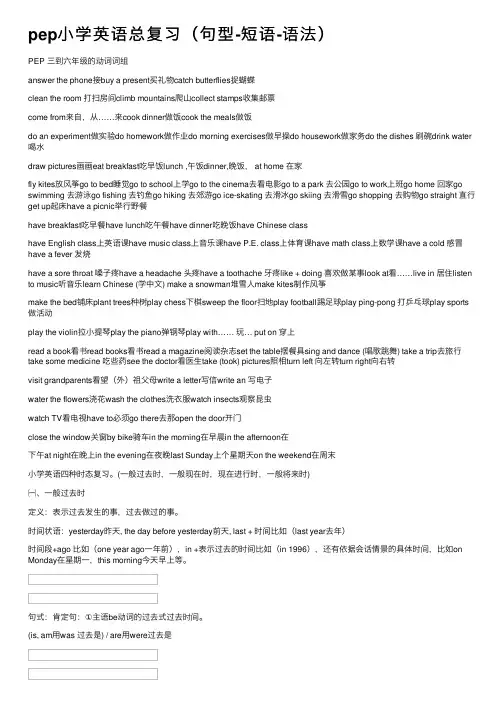
pep⼩学英语总复习(句型-短语-语法)PEP 三到六年级的动词词组answer the phone接buy a present买礼物catch butterflies捉蝴蝶clean the room 打扫房间climb mountains爬⼭collect stamps收集邮票come from来⾃,从……来cook dinner做饭cook the meals做饭do an experiment做实验do homework做作业do morning exercises做早操do housework做家务do the dishes 刷碗drink water 喝⽔draw pictures画画eat breakfast吃早饭lunch ,午饭dinner,晚饭, at home 在家fly kites放风筝go to bed睡觉go to school上学go to the cinema去看电影go to a park 去公园go to work上班go home 回家go swimming 去游泳go fishing 去钓鱼go hiking 去郊游go ice-skating 去滑冰go skiing 去滑雪go shopping 去购物go straight 直⾏get up起床have a picnic举⾏野餐have breakfast吃早餐have lunch吃午餐have dinner吃晚饭have Chinese classhave English class上英语课have music class上⾳乐课have P.E. class上体育课have math class上数学课have a cold 感冒have a fever 发烧have a sore throat 嗓⼦疼have a headache 头疼have a toothache ⽛疼like + doing 喜欢做某事look at看……live in 居住listen to music听⾳乐learn Chinese (学中⽂) make a snowman堆雪⼈make kites制作风筝make the bed铺床plant trees种树play chess下棋sweep the floor扫地play football踢⾜球play ping-pong 打乒乓球play sports 做活动play the violin拉⼩提琴play the piano弹钢琴play with…… 玩… put on 穿上read a book看书read books看书read a magazine阅读杂志set the table摆餐具sing and dance (唱歌跳舞) take a trip去旅⾏take some medicine 吃些药see the doctor看医⽣take (took) pictures照相turn left 向左转turn right向右转visit grandparents看望(外)祖⽗母write a letter写信write an 写电⼦water the flowers浇花wash the clothes洗⾐服watch insects观察昆⾍watch TV看电视have to必须go there去那open the door开门close the window关窗by bike骑车in the morning在早晨in the afternoon在下午at night在晚上in the evening在夜晚last Sunday上个星期天on the weekend在周末⼩学英语四种时态复习。
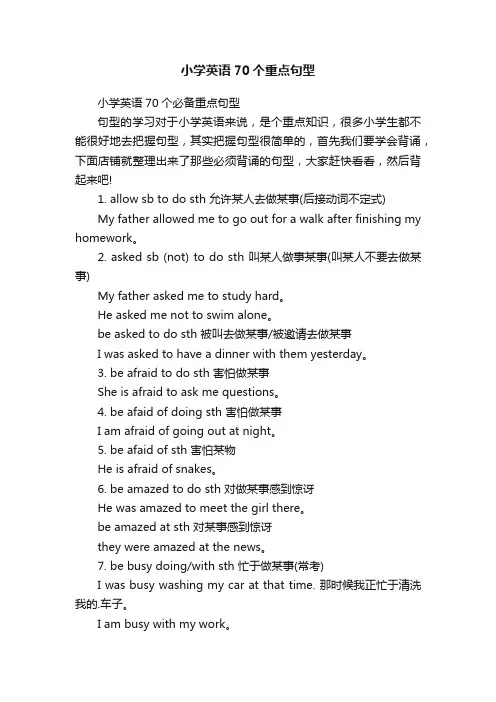
小学英语70个重点句型小学英语70个必备重点句型句型的学习对于小学英语来说,是个重点知识,很多小学生都不能很好地去把握句型,其实把握句型很简单的,首先我们要学会背诵,下面店铺就整理出来了那些必须背诵的句型,大家赶快看看,然后背起来吧!1. allow sb to do sth 允许某人去做某事(后接动词不定式)My father allowed me to go out for a walk after finishing my homework。
2. asked sb (not) to do sth 叫某人做事某事(叫某人不要去做某事)My father asked me to study hard。
He asked me not to swim alone。
be asked to do sth 被叫去做某事/被邀请去做某事I was asked to have a dinner with them yesterday。
3. be afraid to do sth 害怕做某事She is afraid to ask me questions。
4. be afaid of doing sth 害怕做某事I am afraid of going out at night。
5. be afaid of sth 害怕某物He is afraid of snakes。
6. be amazed to do sth 对做某事感到惊讶He was amazed to meet the girl there。
be amazed at sth 对某事感到惊讶they were amazed at the news。
7. be busy doing/with sth 忙于做某事(常考)I was busy washing my car at that time. 那时候我正忙于清洗我的.车子。
I am busy with my work。
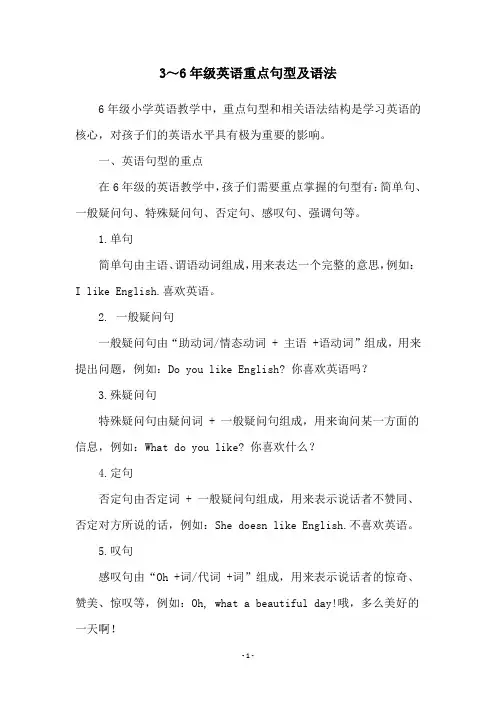
3~6年级英语重点句型及语法6年级小学英语教学中,重点句型和相关语法结构是学习英语的核心,对孩子们的英语水平具有极为重要的影响。
一、英语句型的重点在6年级的英语教学中,孩子们需要重点掌握的句型有:简单句、一般疑问句、特殊疑问句、否定句、感叹句、强调句等。
1.单句简单句由主语、谓语动词组成,用来表达一个完整的意思,例如:I like English.喜欢英语。
2. 一般疑问句一般疑问句由“助动词/情态动词 + 主语 +语动词”组成,用来提出问题,例如:Do you like English? 你喜欢英语吗?3.殊疑问句特殊疑问句由疑问词 + 一般疑问句组成,用来询问某一方面的信息,例如:What do you like? 你喜欢什么?4.定句否定句由否定词 + 一般疑问句组成,用来表示说话者不赞同、否定对方所说的话,例如:She doesn like English.不喜欢英语。
5.叹句感叹句由“Oh +词/代词 +词”组成,用来表示说话者的惊奇、赞美、惊叹等,例如:Oh, what a beautiful day!哦,多么美好的一天啊!6.调句强调句由“It is/was +强调部分 + that/who + 主句”组成,用来强调句子成分,例如:It is I who like English.我喜欢英语。
二、英语语法的重点6年级学生还需要掌握英语语法中的各类词类、时态、句子结构等:1.类词类学生们需要掌握单词、介词、动词、形容词、副词、代词、连词、冠词等英语语法的各类词类,以及其用法。
2.昀学生们要掌握现在时、过去时、将来时等不同时态的表达,了解它们的基本用法及区别。
3.子结构学生们要熟悉句子的简单结构、复合句的构成及连接词,能正确使用并分析句子。
三、综合练习在6年级学习英语时,综合练习也很重要,学生们可以利用实际情景,练习用英语表达句子,并能在日常对话中正确运用。
练习的方法可以是旁听英语对话,分析句子结构,以及反复练习句型,多种形式的练习将更容易帮助孩子们熟练掌握句型和语法。
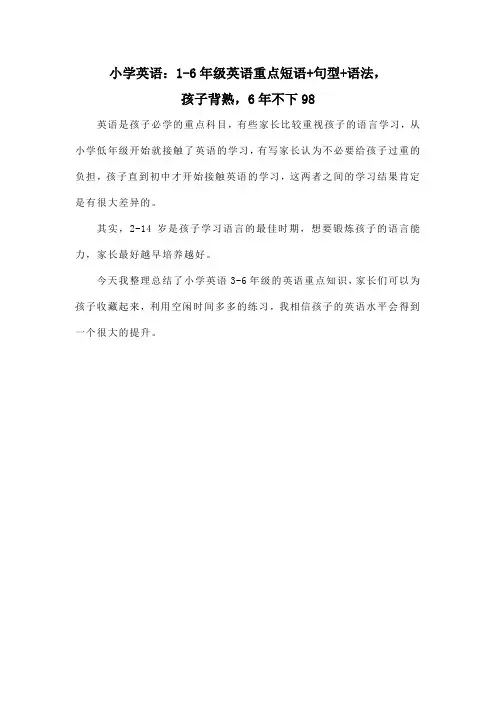
小学英语:1-6年级英语重点短语+句型+语法,
孩子背熟,6年不下98
英语是孩子必学的重点科目,有些家长比较重视孩子的语言学习,从小学低年级开始就接触了英语的学习,有写家长认为不必要给孩子过重的负担,孩子直到初中才开始接触英语的学习,这两者之间的学习结果肯定是有很大差异的。
其实,2-14岁是孩子学习语言的最佳时期,想要锻炼孩子的语言能力,家长最好越早培养越好。
今天我整理总结了小学英语3-6年级的英语重点知识,家长们可以为孩子收藏起来,利用空闲时间多多的练习,我相信孩子的英语水平会得到一个很大的提升。
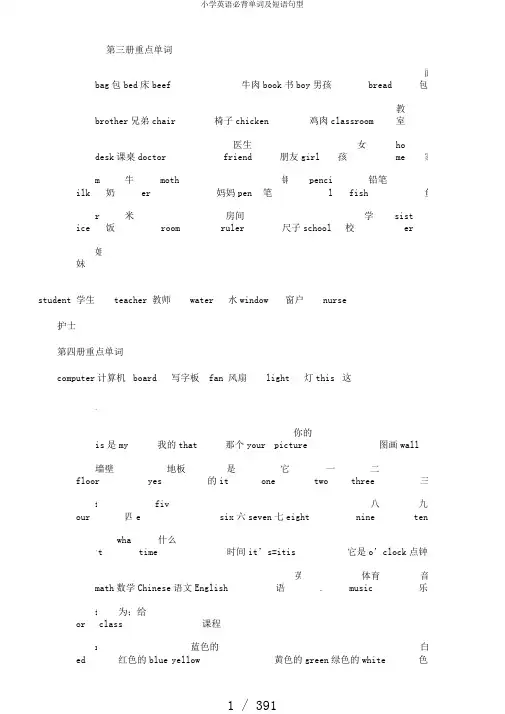
第三册重点单词bag包bed床beef牛肉book书boy男孩bread面包brother兄弟chair椅子chicken鸡肉classroom 教室desk课桌doctor医生friend朋友girl女孩home家m ilk牛奶mother妈妈pen钢笔pencil铅笔fish鱼r ice米饭room房间ruler尺子school学校sister姐妹student 学生teacher 教师water 水window 窗户nurse 护士第四册重点单词computer计算机board 写字板fan 风扇light 灯this 这个is是my我的that那个your你的picture图画wall墙壁floor地板yes是的it它one一two二three三four四five五six六seven七eight八nine九ten十what什么time时间it’s=itis它是o’clock点钟math数学Chinese语文English英语.体育music音乐f or 为;给class课程red红色的blue蓝色的yellow黄色的green绿色的white白色的no不;不是not不是的skirt短裙shirt衬衫jacket夹克衫T-shirtT恤衫dress连衣裙colour颜色warm暖和的cold寒冷的cool凉爽的today今天jeans牛仔裤pants长裤socks袜子shoes鞋子let’s让我们play玩,踢football足球snowy下雪的sunny晴朗的howmuch多少钱big大的small小的long长的short 短的banana香蕉 pear 梨orange 橙子watermelon西瓜are是(复数)they它(他,她)们horse马aren’t不是(复数)cat猫rabbit兔子pig猪duck鸭子dog狗eleven十一twelve十二thirteen十三fifteen十五twenty二十howmany多少there那儿/里第五册重点单词smart聪明的old年老的thin瘦的funny滑稽可笑的tall高的ac tive活泼的but但是quiet安静;文静的very很;非常young年轻strong强壮的kind和蔼亲切的Mr.先生short矮的like像;喜欢strict严格的who’s=whois是谁what’s=whatis是什么he’s=heis他是she’s=sheis她是Monday星期一Tuesday星期二Wednesday星期三Thursday星期四.Friday星期五Saturday星期六Sunday星期天day天;日子have有;吃on在时候too太;也grape葡萄don’t=donot不要fruit水果salty咸的fresh新鲜的.favourite最喜爱的tasty好吃的fish鱼茄子.sour酸的we我们lunch午饭;中餐tomato西红柿potato土豆tofu豆腐greenbeans 青豆they’re=theyare他(她;它)们是.curtain窗帘trashbin垃圾桶closet衣橱.mirror镜子endtable床头柜bedroom卧室.kitchen厨房bathroom卫生间livingroom客厅in在中/里on在上under在下near在附近behind在后面clothe衣服river河流flower花grass草lake湖泊forest森林pat小路park公园house房子bridge桥tree树木road路;公路building建筑物clean干净的eggplant茄子sweet甜的第六册重点单词Apr.四月at在点钟Aug.八月because因为best最;极birthday生日date日期Dec.十二月evening 夜晚;晚上fall秋天Feb.二月fly飞grandpa爷爷;外公her她的Jan.一月J uly七月June六月May五月Mar.三月noon中午Nov.十一月O ct.十月often经常season季节Sept.九月skate滑冰sleep睡觉sometimes有时候spring春天summer夏天swim游泳uncle叔叔usually通常;一般why为什么weekend周末which哪一个winter冬天honey蜂蜜study书房jump跳run跑kangaro袋鼠climb往上爬fight打架swing荡;荡秋千第七册重点单词:by经;乘foot脚bike自行车bus公共汽车train火车how怎样traffic交通stop停;停车站wait等;等待library图书馆postoffice邮局hospital医院cinema电影院bookstor e书店where哪里please请turn转弯right右边left左边straight成直线地then然后comicbook漫画书postcard明信片newspaper报纸buy购置hobby爱好dive跳水live居住teach 教go 去watch 观看read 读;看does助动词doesn’t否认助动词singer 歌唱家writer 作家actor男演员act画家TVreporter电视台记者engineer ress女演员artist工程师accountant会计policeman警察salesperson销售员cleaner清洁工work工作rain 雨;下雨cloud 云;云彩sun太阳stream小溪;小河seed种子soil泥土sprout苗;嫩芽plant植物;种植should应该then然后第八册重点单词taller更高的shorter更矮的stronger更强壮的older年纪更大younger更年轻的bigger更大的heavier更重的longer 更长的thinner更瘦的smaller更小的hurt疼痛:受伤matter 事情sore疼的nose鼻子tired疲劳的excited兴奋的angry生气的happy快乐的bored无聊的sad伤心的last上一个;最后的weekend周末to向:朝park公园Chinese汉语;中国的good好的present礼物boat小船elephant大象how怎样;多么watch-watched观看wash-washed洗clean-cleaned清扫play-played玩visit-visited看望;拜访;参观do-did做go-went 去read-read读:阅读learn-learned学习dance-danced跳舞eat-ate吃take-took照;拍climb-climbed爬have-had有buy-bought买row-rowed划see-saw看见leave-left离开get-got到达三至六年级重点短语Englishteacher 英语老师mathteacher数学老师Chineseteacher语文老师have(an)Englishclass上(一节)英语课onWednesdays在星期三domyhomework做作业watchTV看电视playcomputergames玩计算机游戏myfavourite我最爱的sweepthefloor扫地cookthemeals〔cookdinner〕做饭readbooks看书cleantheroom清洁房间watertheflowers 浇花washtheclothes 洗衣服set thetable 摆餐具make thebed铺床dothedishes洗碗碟gotobed上床睡觉cleanthebedroom清洁卧室useacomputer用计算机nearthetable桌子旁边underthebed床下overtheriver河上方onthedesk书桌上inthecloset衣橱里behindthedoor 门后面apictureofmyroom 一张我房间的照片taller than比高haveafever 发烧havea(bad)cold( 严重)感冒haveatoothache牙疼haveaheadache头疼haveasorethroat喉咙疼watchTV看电视washclothes洗衣服playfootball踢足球visitgrandparents 看望祖父母gotoapark 去公园gofishing去钓鱼goswimming去游泳wenthiking去远足learnChinese学习汉语singanddance唱歌跳舞eatgoodfood吃美食takepictures照相buypresents买礼物rowaboat划船gotoseeelephant 去看大象goskiing去滑雪goice-skating去滑冰readabook〔readbooks〕看书domorningexercises 晨练eatbreakfast/lunch/dinner 吃早/中/晚饭flykites放风筝getup起床gohiking去远足climbmountains〔climbamountain〕爬山climbtrees爬goshopping购物makeasnowman堆雪人playsports进行体育运动playthepiano弹钢琴playtheviolin拉小提琴visitgrandparents看望祖父母drawpictures画画answerthephone接listentomusic听音乐writealetter写信writeane-mail写电子邮件writeareport写报告drink water喝水watch〔count〕insects观察(数)昆虫takepictures照相catchbutterflies 捉蝴蝶come/befrom来自playchess下棋collectleaves/stamps收集树叶/集邮doanexperiment做实验onfoo t走路bytrain坐火车bybus坐公共汽车bybike骑自行车byplane坐飞机stopataredright红灯停makekites制作风筝waitatayellowlight 黄灯等goatagreenlight 绿灯traffic light 交通灯nearthepostoffice 邮局附近nexttothehospital 医院隔壁get to到达turnleft/right 左/右转go/walkstraight 直走geton/off上/下车takeatrip 去旅行gotothecinema 看电影teachEnglish 教英语nextweek下周rideabike骑自行车readnewspapers看报纸liveinBeijing住在北京watchTVatnight晚上看电视readamagazine看杂志gotowork上班plantflowerseeds种花种planttrees种树pickupleaves采摘树叶putawaytheclothes(收拾衣服)emptythetrash(倒垃圾)wake up(醒来)dohousework(做家务)take off(脱掉)puton(穿上)hangup(挂起)疑问词what(什么) which(哪一个) when(什么时候) where(在哪里)why(为什么) how(怎样,如何)howmany(多少) howmuch(多少钱)whatabout〔怎么样〕whattime(几点)单词的缩写I’m=Iam it’s=itis he’s=he is she’s=sheisthat’s=that iswho’s=whois what’s=whatisthey’re=theyareisn’t=isnot aren’t=arenot can’t=cannot don’t=donotdoesn’t=doesnot let’s=let usI’d=IwouldI’ll=Iwill第四册句型Thisismycomputer. 这是我的计算机。
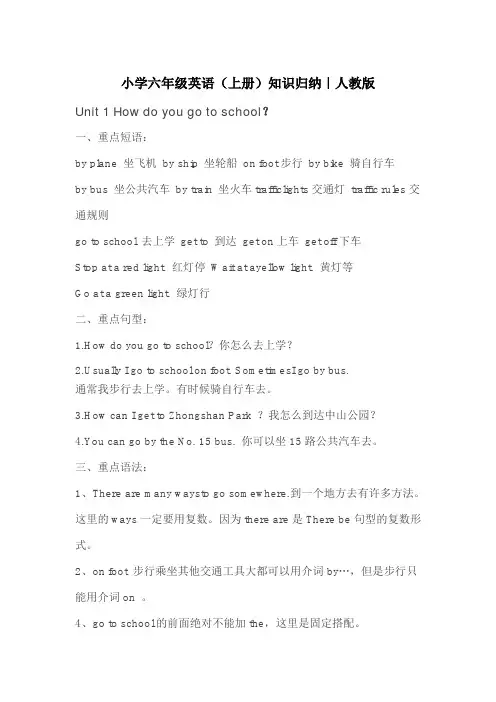
小学六年级英语(上册)知识归纳|人教版Unit 1 How do you go to school?一、重点短语:by plane 坐飞机by ship 坐轮船on foot步行by bike 骑自行车by bus 坐公共汽车by train 坐火车trafficlights交通灯traffic rules交通规则go to school 去上学get to 到达get on上车get off下车Stop at a red light. 红灯停Wait at ayellow light. 黄灯等Go at a green light. 绿灯行二、重点句型:1.How do you go to school?你怎么去上学?ually I go to school on foot. SometimesI go by bus.通常我步行去上学。
有时候骑自行车去。
3.How can I get to Zhongshan Park ?我怎么到达中山公园?4.You can go by the No. 15 bus. 你可以坐15路公共汽车去。
三、重点语法:1、There are many waysto go somewhere.到一个地方去有许多方法。
这里的ways一定要用复数。
因为there are是There be句型的复数形式。
2、on foot 步行乘坐其他交通工具大都可以用介词by…,但是步行只能用介词on 。
4、go to school的前面绝对不能加the,这里是固定搭配。
5、USA 和US 都是美国的意思。
另外America也是美国的意思。
6、go to the park 前面一定要加the. 如果要去的地方有具体的名字,就不能再加the ,如果要去的地方没有具体名字,都要在前面加the. (go to school除外。
)7、How do you go to …?你怎样到达某个地方?如果要问的是第三人称单数,则要用:How does he/she…go to …?8、反义词:get on(上车)---get off(下车)near(近的)—far(远的)fast(快的)—slow(慢的)because(因为)—why(为什么)same(相同的)—different(不同的)9、近义词:see you---goodbye sure---certainly---ofcourse10、频度副词:always 总是,一直usually 通常often经常sometimes 有时候never 从来不Unit 2 Where is the science museum?一、重点短语:library 图书馆post office 邮局hospital医院cinema 电影院bookstore书店science museum科学博物馆turnleft向左转turn right 向右转go straight 直行north北south南east东west西next to靠近、与……。
1.-- Hello. 你好。
--Hi.你好。
2.-What’s your name 你叫什么名字?-My name’. John.我叫约翰。
4、3.-Goodbye! 再见!5、-Bye, Miss White.再见。
6、-Good morning.早上好。
7、Good afternoon.下午好。
6. Nice to meet you.见到你很高兴。
-Nice to meet you, too.见到你也很高兴。
8、7.、--How are you你好吗?9、--I’m fine, thank you.我很好, 谢谢你。
10、Very well, thanks.很好, 谢谢。
--What’s this这是什么?/ What’s that那是什么?-- It’s a duck.(它)是只鸭子。
9 --I’ d like some juice, please.请给我些果汁。
Can I have some water, please请给我些水好吗?--Here you are.给你。
10. You’re welcome.不用谢、Happy birthday!生日快乐!12--How old are you你几岁(了)?-- I’m six years old.我六岁(了)。
1.--Where are you from?你是哪里人?-- I’m from the UK.我是英国人。
2.--Who’s that man 那位男士是谁?--He’s my father. 他是我爸爸。
3.--Who’s that woman 那位女士是谁?--She’s my mother. 她是我妈妈。
4.--Is she your mother 她是你的妈妈吗?--Yes, she is. 是的, 她是。
5.--Is he your father 他是你的爸爸吗?--No.he isn’t.不,他不是。
6、--Where is my pencil box 我的铅笔盒在哪里?--It’s in your desk.在你桌子里。
精心整理小学1-6年级必备的重点英语句型1.allowsbtodosth允许某人去做某事(后接动词不定式) Myfatherallowedmetogooutforawalkafterfinishingmyhomework.2.askedsb(not)todosth叫某人做事某事(叫某人不要去做某事) Myfatheraskedmetostudyhard.Heaskedmenottoswimalone.beaskedtodosth被叫去做某事/被邀请去做某事Iwasaskedtohaveadinnerwiththemyesterday.3.beafraidtodosth害怕做某事Sheisafraidtoaskmequestions.4.beafraidofdoingsth害怕做某事Iamafraidofgoingoutatnight.5.beafraidofsth害怕某物Heisafraidofsnakes.6.beamazedtodosth对做某事感到惊讶Hewasamazedtomeetthegirlthere.beamazedatsth对某事感到惊讶Theywereamazedatthenews.7.bebusydoing/withsth忙于做某事(常考)Iwasbusywashingmycaratthattime.那时候我正忙于清洗我的车子.Iambusywithmywork.8.becoming/going/leaving/flying/moving/dying(某些位移动词用进行时态时表将来) thebusiscoming/thedogisdying.9.beexcitedtodosth对做……感到兴奋Jackywasexcitedtotraveltherebyplane.beexcitedatsthLilywasexcitedathiswords.beexcitedaboutdoingsth Hewasexcitedaboutpassingtheexamwithoutgoingoverthebooks.10.befrightenedtodosth害怕去做某事Samisfrightenedtorideahorse.11.beglad/happytodosth高兴去做某事Sheishappytocleantheblackboardwithme.bepleasedtodosth高兴做某事Shewaspleasedtohelptheoldmanyesterday.bepleasedwithsth对某事感到高兴/满意Theteacherwaspleasedwithmyanswer.12.beinterestedinsth/doingsth对某事感兴趣/对做某事感兴趣Sheisinterestedinswimmingintheriver.MybrotherisinterestedinChinese.13.be/getreadyfor/todosthbereadyfor为某事做好了准备Wearereadyfortheexam.Bereadytodosth为做某事做好了准备Wearereadytohaveabirthdaypartyforher.getreadyforsth为某事在做准备Wearegettingreadyfortheexam.14.besurprisedtodosth对做某事感到惊奇besurprisedatsth对某事感到惊奇I'dbesurprisedtoseehimonsuchanoccasion. Iamsurprisedatwhathehasdone.15.beworthdoingsth值得做某事(worth后接动词-ing形式,常考) Thisdictionaryisexpensive,butitisworthbuying. Thebookisworthreading.16.开始去做某事begintodosthbegin/starttodo/doingsth Whendochildrenbegintogotoschool?17.can/beabletoafford(tobuy)sth有能力负担(购买)……Atthisratewewon'tbeabletoaffordaholiday.18.can/may/mustdosthcould/would/should/mightdosth Wemaycomeatanothertime.19.can'twaittodosth迫不急待地去做某事Ican’twaittohearthenews.20.decidetodosth决定去做某事makeupone'smindtodosth下决心去做某事(常考) makeadecisiontodosth对做某事作出决定Whatdotheydecidetodo?Ihavemadeupmymindtostudyhard.21.deservetodosth值得/应该做……Wemustadmitthatshediddeservetowin.22.encouragesbtodosth鼓励某人去做某事Encouragethemtodosomeotherhelpfulrecreations.23.enjoydoingsth喜欢去做某事Ienjoyreadingthestorybook24.expect(sb)todosth期望去做某事Don'texpecthimtohelpyou.25.failtodosth做某事失败succeedindoingsth成功做了某事Ifyoudon'tgooverthebooks,youwillfailtopasstheexam.26.finishdoingsth做完某事(后接动词-ing形式)(常考) Afterfinishdoingyourhomework,youcanhavearest.27.followsbtodosth跟随某人去做某事Followmetoreadthenewwords.28.getsbtodosth/makesbdosth/letsbdost让某人做某事(后接动词原形) Herjokesmadeuslaugh.29.get/haveachancetodosth得到一个做某事的机会I'mveryhappytohaveachancetovisityourschool.30.give/pass/show/lend/sellsbsth/sthtosbbuy/get/bringsbsth/sthforsbPleasegivemeapieceofpaper. Iboughthimadrinkinreturnforhishelp.31.goontodosth/goondoingsth继续做事(常考) Goondoingtheexerciseafterashortrest.32.hatetodo/doingsth讨厌/不喜欢做某事Ihatetotellthenewstoyou.33.havefundoingsth做某事很有趣Havefungettingtoknoweachother.Havefunplayinggameswithyou.Havefuntalkingwithyou.34.haveproblemsdoingsth做某事遇到困难Manypeoplehaveproblemsgettingtosleepatnight.35.havesbdosth/havesthdone让某人做某事Thisisthebestworkyouhaveeverdone.36.hearsbdosth听到某人做某事(后接动词原形,常考)hearsbdoingsth听到某人正在做某事(常见)Iheardsomeonelaughing.37.helptodosth帮忙做某事helpsb(to)dosth帮助某人做某事I'llhelpyoucleantheroom.38.hope/wishtodosth希望做某事wishsbtodosth希望某人做某事Iwishtotakethisopportunitytothankyouall.39.Itseemsthat这像是……(后接从句)seemtodosthseem+adjItseemsthatyouarelying.Doesthatseemtomakesense?40.It's+adj+(forsb)todosth.It's+adj+(ofsb)todosthIt'sgladforhimtohearthenews.41.Ittakessbsometime/moneytodosth花费某人多长时间做某事(常考) Ittakesmeanhourtowalkthereandback.42.pay…for…costspend…on…..ittake…todosth花费Hepaidforitoutofhisownpocket.43.It'sbestforsbtodosth.对某人来说做某事是最好的It'sbestforyoutodomoreexercise.hadbetterdosth最好做某事(注意had没有时态和人称的变化,better后接动词原形) Youhadbettergototheschool.44.It'stimeforsbtodosth是某人做某事的时候了It'stimeforustohavedinner.45.keep(on)doingsth坚持做某事(常考)Johnalwayskept(on)askingquestions.keepsbdoingsth让某人做某事(常考)Don'tkeepmewaiting.keepsbfromdoingsth阻止某人做某事(常考) Hekeepsherfromcuttingthetree.keepsb/sth+adj使某人保持……的状态Washingyourhandskeepsyouhealthy.46.learntodosth学做某事Ilearntoplayfootball.learnsthfromsb向某人学习Ilearnthespiritfromhim47.liketodo/doingsth喜欢做某事likesbtodosth喜欢某人做某事Shelikesswimming./Shelikestoswimthisafternoon.48.needtodosth/needdoingsth/needtobedone需要做某事Thegardenneedstobewatered./Thegardenneedswatering.49.prefertodosthratherthandosth宁愿……而不愿……(常考) Iwouldprefertospendtheweekendathomeratherthandriveout. preferdoingsthtodoingsth喜欢做……胜过做……Ipreferreadingbookstogoingshopping.比起购物来,我更爱读书.prefertodosth喜欢(爱)做某事50.refusetodosth拒绝做……Irefusetoanswerthatquestion.51.remember/forgettodosth记得/忘记做某事(没有发生) Pleasedoremembertopostaletterforme.务必记得帮我寄信.remember/forgetdoingsth记得/忘记做过某事Iremembertellingyouthenewsbefore.我记得曾经告诉过你这个消息.52.seesbdosth看见某人做某事(结果)seesbdoingsth看见某人正在做某事(正在进行中)beseentodosth做某事被看见Isawthemplayfootballlastweekend.Isawhercleaningtheclassroom.Isawhimgetonthebus.=Hewasseentogetonthebus.53.somethingtoeat/drink一些吃/喝的东西(词不定式放在something等后修饰这些词) Ineedsomethingtoeat.我要一些吃的东西.54.spendsometime(in)doingsth/onsth花费时间做某事(注意动词要用ing形式)(常考) Ispent2hoursonhomework.=Ispent2hoursindoinghomework. spendsomemoneyonsth/doingsth买……花了多少钱Ioftenspendsomemoneyonthebook.Ioftenspendsomemoneybuyingthebook.55.Sthishard/difficult/easytodo.做好某事很难/容易Thequestioniseasytoanswer.56.stoptodosth停下来去某事(两件事)(常考)stopdoingsth停止做某事(一件事)(常考)stopsb(from)doingsth阻止某人做某事(常考) Thetwogirlsstoppedtotalktomewhentheysawme. Thetwogirlsstoppedtalkingwhentheysawme. Itriedtostopmyfatherfromsmoking,butfailed.57.taketurnstodosth轮流做……Theytaketurnstodothecleaning.58.tellsb(not)todosth叫某人去(不要)做某事Hetellmenottoswiminthatlake.59.Thereisnoneed(forsb)todosth对某人来说没必要做某事Thereisnoneedforyoutoworry.60.Thereisnotime(forsb)todosthhavenotimetodosth没时间做某事Thereisnotimetothink.Ihavenotimetodomorningexercises.61.too…(forsb)to…太……以致不能Theboyistooyoungtogotoschool.62.try/doone'sbesttodosth尽力去做某事trytodosth试着(图)做某事Wemusttryourbesttodothejob.edtodosth过去常做某事Iusedtoliveinthecountry.usedtobe+adj/a+n曾经是...Mr.Wangusedtobeateacherworker.64.wouldliketodosth=wanttodosth=feellikedoingsth想要做……want/wouldlikesbtodosth想某人做……Idon'tfeellikewalkingverymuchtoday.Iwouldlikeyoutogoaway.65.warnsb(not)todosth警告某人做某事(或不要做某事) Hismotherwarnedhimnottogooutintheevening.66.Whydon'tyoudosth?=Whynotdosth?为什么不……(表建议的句型,注意用动词原形) Whynothavearest?表示建议的句型还有:Shallwe……?What/Howabout……?(如果是动词,要用ing形式)Howaboutgoingfishing?67.Wouldyoulike(sb)todosth?Yes,I'dloveto.Wouldyouliketojoinus?Wouldyoulikemetobuyyousomefood?68.Wouldyouminddoingsth?你介意做某事吗?回答:不介意(No+……)Nevermind/Notatall/Ofcoursenot/Certainlynot.(从不介意/一点也不介意/当然不会了)回答:介意(Yes+……)I'msorrybutIdo./Sorry,you'dbetternot./I'mafraidyoucan't.-Wouldyoumindmyopeningthedoor?-No,ofcoursenot.69.Wouldyouplease(not)dosth你可不可以做(不做)……? Wouldyoupleaseopenthedoor?/Wouldyoupleasenotclosethewindows?70.常用固定短语finishdoingsth完成某事Shefinishedcleaningtheroom.practisedoingsth练习做某事You'dbetterpractisingreadingandspeakingEnglisheveryday.begoodatdoingsth擅长做某事Iamgoodatplayingbasketball.goondoingsth继续做某事,指前后做的是同一件事. Thestudentswentontalkingandlaughingalltheway. Goondoingtheotherexerciseafteryouhavefinishedthisone.bebusydoingsth忙于做某事Iambusyincleaningmyroom.see/hear/watchsbdoingsth听/看/观察到某人正在做某事Ihearhimsinging.beafraidofdoingsth担心(害怕)会发生某事Mylittlesisterisafraidofstayingathomealone. beinterestedindoingsth对做某事的兴趣. I'minterestedinplayinggames.。
【导语】学会整合知识点。
把需要学习的信息、掌握的知识分类,做成思维导图或知识点卡⽚,会让你的⼤脑、思维条理清醒,⽅便记忆、温习、掌握。
同时,要学会把新知识和已学知识联系起来,不断糅合、完善你的知识体系。
这样能够促进理解,加深记忆。
以下是©⽆忧考⽹整理的《⼩学三年级上册英语知识点:重点句型》,希望帮助到您。
【Unit 1】
1、show me your pencil / ruler/ eraser/ crayon/ pen.
让我看看你的铅笔/尺⼦/橡⽪/蜡笔/钢笔。
2、open your pencil--case.
打开你的铅笔盒。
3、 close your book .
合上你的书。
4、show me your sharpener.
让我看看你的卷笔⼑。
5、carry your bag.
背起你的书包。
6、go to school .
去上学。
【Unit 2】。
最新外研版小学英语3-6年级上册重点句型短语复习提纲NO1.三年级上册复习提纲一、词汇:1.常用物品:door, window, desk, chair, blackboard, schoolbag,门,窗,课桌,椅子,黑板,书包pencil, pen, book, cap, present, cake, ball, kite铅笔,钢笔,书,帽子,礼物,蛋糕,球,风筝颜色:red ,blue, green, yellow, black(红色,蓝色,绿色,黄色,黑色)2.动物:panda, dog, cat, bird, chameleon(熊猫,狗,猫,鸟,变色龙)3.数字:one,two,three,four,five,six,seven,eight,nine,ten,eleven,twelve.4.身体器官:head, leg, foot, arm, hand, eye, nose, mouth, ear.(头,腿,脚,手臂,手,眼睛,鼻子,嘴巴,耳朵)5.家庭成员:father, mother, grandpa,grandma, sister, brother.(爸爸,妈妈,爷爷,奶奶,姐姐,弟弟)6.职业:teacher, pupil, doctor, nurse, driver, farm, policeman.(老师,学生,医生,护士,司机,农民,警察)7.代词:I, you ,it, he, she, me, my, your, his, her, this, that.(我,你,它,他,她,我,我的,你的,他的,她的,这个,那个)二、句型:1.打招呼及问好:Hello! Hi!(你好)早上见面说:Good morning! (上午好) 下午见面说:Good afternoon! (下午好)跟人道别语:Goodbye! Bye-bye! (再见)跟人道谢语:Thank you ! (谢谢)询问对方的身体情况:How are you? (你好吗?)回答:I’m fine,thank you.(我很好,谢谢。
小学重点知识总结一、单词(一)词形转换 :China(形容词)—Chinese here(同音词)—hearlesson(同义词)—class good(反义词)—badinterest(形容词)—interesting buy(同音词)—by/byeminus(反义词)—plus she(宾格)—herright(同音词)—write he(宾格)—himright(反义词)—wrong/left open(反义词)—closegood(副词) —well(二)同音词二、重要句型1. -What day is it today?-It’s…该句用来询问今天是星期几,回答为It’seg:What day is it today?It’s Wednesday.2.-What lessons do you have in the morning? 上午你们有什么课?-We have…and …该句用来询问别人在上午有什么课程。
注意lesson要用复数形式lessons eg:-What lessons do you have in the afternoon?-We have Chinese, Maths , English ,and Science .3. -What subject do you like? 你喜欢什么科目?-I like Social Science.该句用来询问对方喜欢哪一门学科。
4. How many lessons do they have a week? 他们一周内有多少节课?该句用来询问一周有多少节课。
询问数量时,用how many对可数名词进行提问,用how much 对不可数名词进行提问。
例题讲解(1)It’s Tuesday. 今天星期二。
( 对划线部分提问)What day is it today ? 今天星期几?(2)I like English and Maths. ( 对划线部分提问)What subject do you like? 你喜欢什么科目?(3) We have eight subjects this term. ( 对划线部分提问)How many subjects do you have this term? 对数量提问用how many(4) We have Chinese, Maths and English in the morning. ( 对划线部分提问)What lessons do you have in the morning? 你们早上有什么课?5. How do you feel now? 你现在觉得怎么样啊?I feel…( tired, hot, thirsty, ill…) 我觉得…(累的,热的,渴的,病的)。
小学四年级英语重点句型及语法规则一、简单句的构成英语的简单句由主语和谓语组成,主语通常是句子的主题,而谓语则描述主语的动作或状态。
例如:•主语 + 谓语:Tom eats an apple.•主语 + 系动词 + 表语:She is tall.二、五大时态在英语中,动词的时态是用来表示动作发生的时间。
小学四年级中,学生们需要掌握五个基本时态:一般现在时、一般过去时、一般将来时、现在进行时和过去进行时。
1. 一般现在时一般现在时用于描述经常发生的动作、情况或普遍真理。
肯定句结构:主语 + 动词原形 + 其他例如:•I play basketball after school.•She likes to sing songs.否定句结构:主语 + do/does + not + 动词原形 + 其他例如:•I do not play basketball after school.•She does not like to sing songs.疑问句结构:Do/Does + 主语 + 动词原形 + 其他?例如:•Do you play basketball after school? •Does she like to sing songs?2. 一般过去时一般过去时用于描述过去发生的动作或情况。
肯定句结构:主语 + 动词过去式 + 其他例如:•I played basketball yesterday.•She danced at the party last night.否定句结构:主语 + did not + 动词原形 + 其他例如:•I did not play basketball yesterday.•She did not dance at the party last night.疑问句结构:Did + 主语 + 动词原形 + 其他?例如:•Did you play basketball yesterday?•Did she dance at the party last night?3. 一般将来时一般将来时用于描述将来发生的动作或情况。
小学英语基础知识及重点句型一、基础知识1、词汇名词:人物boy girl mother father brother sister friend cousin driver dancer pupil teacher policeman nurse farmer doctor Ms Mr动物animal dragon tiger lion elephant monkey panda dog cat bird五官身体部分head eye nose ear mouth hand arm foot leg hair食物food cake rice meat bread noodles soup fish chocolate mango banana apple pear orange peanut sweets biscuit vegetable milk fruit watermelon ice cheese juice coffee tea场所方位classroom class school home farm house road supermarket station park lake sea river east west north south国家China England America country交通工具bike bus train boat plane学科English, Chinese, Math, Science玩具kite, toy, computer game, doll, jigsaw, chess, ball文具bag pencil pen book时间time today day hour yesterday tomorrow morning afternoon evening weekend spring summer autumn winter January February March April May June July August September October November December Monday Tuesday Wednesday Thursday Friday Saturday Sunday服装hat dress coat T-shirt clothes sweater教室中的物品desk chair door window其它名词name present box bottle song winner Christmas tree letter metre kilo homework robot weather postcard matter game life radio Cold headache fever动词:运动play football, play basketball, play table tennis, do morning exercises, go swimming, go cycling, run, high jump, ride, row a boat,系动词am is are was were feel smell情态动词can need may should其它动作want, make, cook, wash, please, draw, thank, think, point to, sit down, stand up, know, help, hope, look see, have, has, like, sing , read, write, draw, learn, listen, hear, say, talk, tell, study, speak, drink, drop laugh, give, visit, catch, dance, carry, live, agree, stop, finish, wait, get up, have breakfast, go to school, go to work, have lunch, go home, have dinner, watch TV, take pictures, go straight on, turn right, turn left, understand, argue, wear,went bought had met ran lost learnt形容词:颜色red blue yellow green black orange purple pink white天气hot cold warm cool windy sunny心情感觉fine, happy, favorite, hungry, difficult, thirsty sad, bored, angry, tired, sorry其它big small short tall old young new thin fat, great, strong, blind, deaf nice shy clever naughty cool cute good bad carefullong wide interesting beautiful wonderful many much famous quiet dangerous better, worse, useful,last dear clean enough副词:疑问副词where when how why其它副词here there now then very up down fast high well badly really hard代词:人称代词I we you he she they it物主代词my our your his her their its mine yours hers his指示代词this that these those不定代词some many much any疑问代词what, whose, How many, How old, who, How much,数词one two three four five six seven eight nine ten eleven twelve thirteen fourteen fifteen sixteen seventeen eighteen nineteen twenty thirty forty fifty sixty seventy eighty ninety hundred介词:on in under to at past by with冠词:a an the连词:and, but, because, so, than其它:Yes, No, Hello, Goodbye, Thank you, too, Happy birthday, o’clock, Happy New Year, Spring Festival, Children’s Day, Let’s, Excuse me, Sport Day, Good luck, Come on, Of course, The Great Wall,话题:能理解和表达有关下列话题的简单信息:数字、颜色、时间、天气、食品、服装、动物、身体、个人情况、家庭、学校、文体活动、节日等。
六、功能:了解问候、告别、感谢、致歉、介绍、请求等交际功能的基本表达形式。
二、小学英语重点句型1.Good morning.2.Good afternoon.3.How are you?I’m fine, thank you.And how are you?I’m fine, too.4.What’s your name?My name is Sam. / I’m Sam.5.How many? It’s ten.6.How many boys? Ten boys.7.How many girls? Eleven girls.8.Stand up/ Sit down.9.Point to the door. /window, chair…10.What’s this?It’s a book.11.What’s that?It’s a chair.12.Happy birthday. Thank you.13.Where’s my present ?It’s in the hatIt’s on the hat.It’s under the hat.14. How old are you?I’m eleven.15.Is it a dog?Yes, it is./ No, it isn’t.16. This is my mother.She’s a teacher.This is my father.He’s a doctor.This is my grandpa.He’s a polic eman.This is my grandma.She’s a driver.This is my brother.He’s a farmer.This is my sister.She’s a nurse.It’s me.I’m a pupil.17.This is my hand.This is my nose.This is my mouth.These are my eyes.These are my ears.These are my feet.18.What are they?They are monkeys.Are they tall?No, they aren’t.Are they thin?Yes, they are.19.I like football.I don’t like basketball.I like swimming.I don’t like skipping rope.I like skipping rope.I don’t like cycling. 20.What’s your favourite colou r? It’s blue.21.Sam likes toy cars.He doesn’t like Barbie dolls. 22.Amy likes Barbie dolls.She doesn’t like computer games 23.Do you like noodles?Yes, I do./ No, I don’t.24.Does Lingling like meat? Yes, she does./ No, she doesn’t. 25.What’s the time , please?It’s four o’clock.It’s half past three.26.I have breakfast at six o’clock.I go to school at eight o’clock.I have lunch at twelve o’clock.I go home at half past five.I have dinner at half past six.27.What do you do at the weekend?I play basketball.I watch TV.I play football.I play table tennis.I go swimming.28.What does Sam do at the weekend?He plays basketball.He watches TV.He plays football.He plays table tennis.He goes swimming.29.What does Amy do at the weekend?She plays basketball.She watchesTV.She plays football.She plays table tennis.She goes swimming.30.What do you have at school?At school I have Chinese, Maths, English and Science.31.Happy New Year.32.Happy Christmas.33. SpringIt’s spring.It’s wa rm in spring.We go cycling in spring.34.SummerIt’s summer.It’s hot in summer.We go swimming in summer.35. AutumnIt’s autumn.It’s cool in autumn.We play football in autumn.36. WinterIt’s winter.It’s cold in winter.We watch TV and play table tennis in winter.37.What do you do in spring?I go cycling in spring.What do you do in summer?I go swimming in summer.What do you do in autumn?I play football in autumn.What do you do in winter?I watch TV and play table tennis in winter.38. How do you go to school?I go to school by bus.(或by train, by car, by bike)I go to school on foot.I walk to school.39.How does your father go to work?He goes to work by car.How does your mother go to work?She goes to work by bike.40.Have you got a tiger?Yes, I have./ No, I haven’t.Have you got a new sweater?Yes, I have. / No, I haven’t.41.Has he got a new toy plane?Yes, he has. / No, he hasn’t.Has she got a new dress?Yes, she has./ No, she hasn’t.42.This is my mother. She’s watching TV.Thi s is my father. He’s reading a book.This is my grandma. She’s writing a letter. This is my grandpa. He’s taking a picture.43. What are you doing?I’m watching TV.44.Do you want some rice?Yes, please./ No, thank you.45.Have you got chopsticks inEngland ?Yes, we have./ No, we haven’t.45.What are they doing?They’re rowing a boat.46.Can you jump far?(run fast, jump high, ride fast)Yes, I can./ No, I can’t.46.It’s time to go to bed.47.We’re going to go to Hainan tomorrow.48.What are you going to do for Sports Day?I’m going to run 100 metres.49.Can I have an apple?Yes, you can./ Sorry, you can’t.50.Can I have some soup?Yes, you can./ Sorry, you can’t.51.There is some fish.(不可数名词)There are some sweets. (可数名词)There isn’t any soup. (不可数名词)There aren’t any biscuits. (可数名词)52.How many birthdays are there in January?There is one. There four. There aren’t any.53.This is Xiaoyong. He’s a clever pupil. He’s very clever.54.This is a book about London. It’s very nice.55.London is the capital of England.56.This the River Thames. It’s very long and very wide.57.This is Big Ben. It’s very old and very tall.58.This is Hyde Park. It’s very beautiful.59.This is Tower Bridge. It’s very famous and very beautiful.60.We’re going to have a picnic.61.Will you take a ball?Yes, I will./ No, I won’t.62.do t’ai chi or t’aijiquan打太极拳row a dragon boat划龙舟run fast跑得快jump high(或do high jump)跳高jump far(或do long jump)跳远ride fast 骑车骑得快run 100 metres跑100米make a cake(或make cakes)做蛋糕play the flute吹笛子wash clothes洗衣服draw a dragon画龙play football踢足球play basketball打篮球play table tennis打乒乓球swim游泳turn on开(灯)Monday星期一Tuesday星期二Wednesday星期三Thursday星期四Friday星期五Saturday星期六Sunday星期日63.What is Amy doing?She’s reading a letter.64.I like playing football.65.I love watching TV.66.I like football and watching TV.67.Robots will do everything.68.Robots can walk.69.It will be windy in Beijing.70.It will rain in Hanzhou.71.Amy’s taller than Lingling.72.I’m shorter than Daming.73.Beijing is bigger than Tianjin.74.I think this girl is better than the first girl.75.Do you agree?76.This boy is worse than that boy.77.Washington D.C is the capital of the USA.78.People speak English in America.79.I was two then. Now I am ten.80.He was two then. Now he’s ten.81.They weren’t old then. They were very young.82.Did you help your mother on Saturday? Yes, I did. / No, I didn’t.83.Did Amy help her mother? Yes, she did. / No, she didn’t.84.Did Daming go to school? Yes, he did. / No, he didn’t.85.Where did you go? I went to the Great Wall.86.What did you do yesterday? I played basketball.87.What did you see? I saw some big mountains.88.What did you eat? I ate some bread.89.What did you buy? I bought some pictures.90.Sam had chocolate biscuits yesterday.Today he’s got a stomac hache.91.Amy had a cold yesterday. Today she’s got a headache.92.Lingling had a headache yesterday. Today she’s got a fever.93.I’ve got a fever.94.There was a tree.95.There were many trees.96.There wasn’t a chair.97.There weren’t many flowers.98.How many bananas do you want? Five bananas, please.99.How much cheese do you want? Half a kilo, please.100.It was sunny, so we could play basketball.101.It rained yesterday, so se couldn’t play basketball.102.Is this your cap? Yes, it’s mine./ No, it isn’t. It’s hers.103.Whose book is this? It’s hers.104.There is too much rubbish.There aren’t enough sun.There are too many chickens.There isn’t enough food.There are too many children.There aren’t enough chairs.105.I can play football well.106.Can you control the ball?Yes, I can. / No, I can’t.107.This man is blind. He cannot see . He cannot walk well by himself. This dog helps him. 108.This girl is deaf. She cannot hear well by herself. This dog helps her.109.These firemen cannot find people by themselves. But these dogs help them.110.What time do you get up? I get up at half past six.111.Are you feeling happy? Yes, I am. / No, I’m not.112.You should look. Then cross the road. 113. You shouldn’t walk in the road.114.Should he do his homework? Yes, she should. 115.Should she watch TV? No, she shouldn’t.。